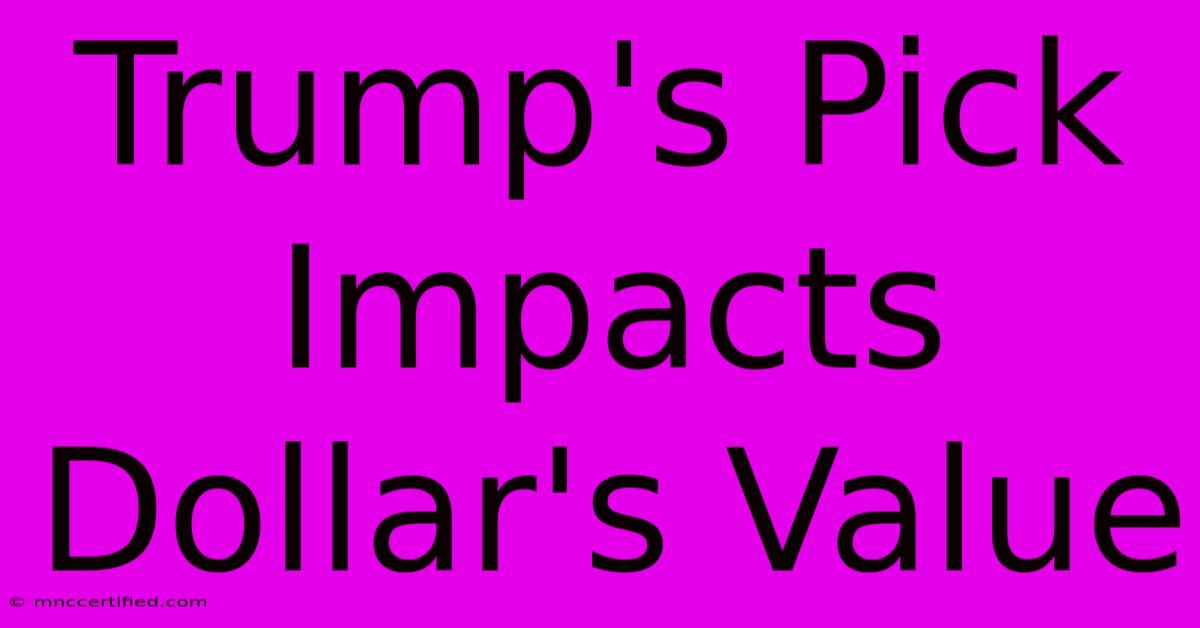Trump's Pick Impacts Dollar's Value

Table of Contents
Trump's Pick Impacts Dollar's Value: Understanding the Economic Ripple Effect
The value of the US dollar is a complex beast, influenced by a multitude of factors including global economic trends, interest rates, and political stability. However, high-profile political appointments, particularly those within the economic sphere, can significantly impact investor sentiment and, consequently, the dollar's strength. Donald Trump's presidential picks offered a prime example of this intricate relationship, demonstrating how political decisions can ripple through the financial markets.
The Trump Administration and Economic Appointments: A Case Study
During his presidency, Donald Trump appointed several key figures to positions directly impacting economic policy. These appointments sparked considerable market reaction, leading to fluctuations in the dollar's value. The choices, often characterized by a focus on deregulation and protectionist trade policies, sent clear signals to investors regarding the potential future direction of the US economy.
Analyzing the Impact of Key Appointments
Let's examine some specific examples of how Trump's appointments influenced the dollar:
-
Treasury Secretary: The selection of the Treasury Secretary, a pivotal role in managing the US economy and influencing global financial markets, played a crucial part in shaping investor confidence. The nominee's economic philosophies and experience directly impacted market expectations regarding fiscal policy, inflation, and interest rates – all key drivers of the dollar's value. A hawkish stance, emphasizing fiscal responsibility and strong dollar policy, could bolster the currency, while a more dovish approach might weaken it.
-
Federal Reserve Chair: While the Federal Reserve Chair is appointed by the President but operates independently, the choice still holds significant symbolic weight. The Chair's monetary policy decisions – particularly regarding interest rates – directly affect the dollar's attractiveness to foreign investors. A policy of raising interest rates, for example, typically strengthens the dollar, as it makes US assets more appealing.
-
Trade Representatives: Trump's focus on trade protectionism, implemented through tariffs and trade negotiations, significantly affected the dollar's value. Uncertainty surrounding trade relations and potential disruptions to global supply chains often led to market volatility and dollar fluctuations. Investors often seek safe havens during such times of uncertainty, sometimes boosting the dollar's value as a result.
Understanding the Mechanisms: How Appointments Affect the Dollar
The impact of Trump's appointments on the dollar wasn't simply a matter of direct cause and effect. The mechanism is more nuanced, involving several key steps:
-
Market Expectations: The announcement of a potential appointee creates immediate market speculation about their likely policies. This speculation drives immediate price changes in financial markets, including the foreign exchange market where the dollar is traded.
-
Investor Sentiment: The perceived competence, experience, and ideological leanings of the appointee influence investor sentiment. Positive sentiment leads to increased demand for dollar-denominated assets, strengthening the currency. Conversely, negative sentiment can weaken the dollar.
-
Policy Changes: Once in office, the appointee's actual policies and actions further influence the dollar. These actions confirm or contradict initial market expectations, leading to further adjustments in the dollar's value.
The Long-Term Implications
The impact of Trump's picks on the dollar’s value wasn't always immediate or consistent. The effects were often intertwined with other economic factors, and the long-term implications are still being assessed by economists. However, the episode highlights the crucial link between political leadership, economic policy, and currency valuation.
Conclusion: Navigating the Political-Economic Landscape
Understanding the influence of political appointments on the dollar's value is crucial for investors, businesses, and anyone navigating the complexities of the global economy. While predicting the precise impact of future appointments remains challenging, analyzing the historical context, such as Trump's presidency, offers valuable insights into the dynamics at play. By carefully considering the potential implications of political choices, stakeholders can better prepare for and adapt to the resulting shifts in the global financial landscape. Staying informed about key economic appointments and their associated policy positions is key to successfully managing financial risks.

Thank you for visiting our website wich cover about Trump's Pick Impacts Dollar's Value. We hope the information provided has been useful to you. Feel free to contact us if you have any questions or need further assistance. See you next time and dont miss to bookmark.
Featured Posts
-
Bob Geldofs Band Aid 40 Backlash
Nov 26, 2024
-
Improve Celtics Clutch Play Action Plan
Nov 26, 2024
-
Immigration Bail Bonds Near Me
Nov 26, 2024
-
Dodge And Cox Global Bond Fund
Nov 26, 2024
-
Can You Switch Insurance Agents
Nov 26, 2024